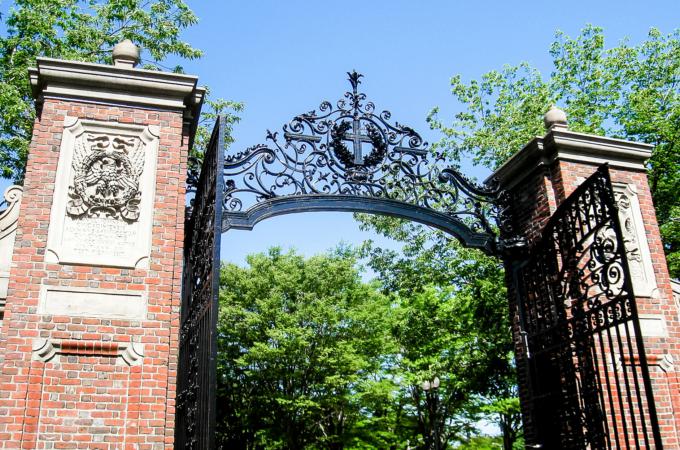Lessons of a Catholic Rhodes Scholar
Aurora Griffin, the author of "How I Stayed Catholic at Harvard" (Ignatius Press, 2016), studied classics at Harvard, won a Rhodes Scholarship to Oxford, where she studied theology, and has accepted a job offer with the prestigious consulting firm, McKinsey. That is quite a series of credentials. And now she has written her first book.
By its title you might suppose that the book is another offering in the genre of "how to stay Catholic in a hostile secular environment." Yet it is not that, but rather an enthusiastic recommendation for the way that she and her Catholic friends lived the faith while they were undergraduates. Her core idea, although she does not express quite it this way, is that every Christian must be a "disciple." Or, as Blessed John Henry Newman says in many places, every Christian serious about his faith must commit to living "under a rule."
The book embraces the lesson of Psalm 1, "Blessed is the man who does not walk in the counsel of the wicked, ... Rather, the law of the LORD is his joy; and on his law he meditates day and night. He is like a tree planted near streams of water, that yields its fruit in season; Its leaves never wither; whatever he does prospers." Griffin wants to tell a young person starting out in adult life is that if you come to know, love and serve the Lord, not vaguely, but through definite practices, you will prosper. She is living proof of that: precisely because of her way of life, she says, she studied hard, was a big success at Harvard, and even won a Rhodes Scholarship.
Of course, true prosperity does not entirely coincide with worldly ideas. And I can see someone objecting that the book does not emphasize enough the gospel of the Cross and risks presenting instead a mere gospel of success. And yet to me, as an educator and father, the balance seems basically correct for a readership of college students.
Griffin presents the rule that she and her friends followed in the accessible form of "40 tips for fellow students," offering congenial explanations of each: daily Mass, daily mental prayer, daily Rosary, daily spiritual reading and reading of the Gospel, weekly confession, eucharistic adoration, and retreats. She emphasizes that Christianity must be lived in community, so among her recommendations is to form friendships with like-minded "disciples," for sharing and support. In sum, Griffin gives the same recommendations for a "plan of life" as all the saints.
Although the book might give the impression of being merely a "do it yourself" book for the spiritual life -- which would be misguided, as no one can be his own coach -- it is saved from this fault in its recommending at the start that students seek formation from good spiritual directors, from their pastor, and, if possible, from involvement with FOCUS and Opus Dei. Griffin also correctly observes that college years should be a time not of self-assertion but of discerning one's vocation in the presence of God.
Her recommendations about the moral life are also sound, but, probably because her format commits her to explaining each "tip" very briefly, her discussions in this section of the book tend to be superficial. They perhaps do not give adequate weight to human weakness, or to how Catholic students in secular universities may be suffering from the lack of institutional support for their path. The hook up culture? "Of course, extramarital sex is not morally acceptable for Catholics under any circumstances." Pornography? "While pornography use is common, it is not acceptable." She says more on each point, of course, but generally a level of steady virtue seems presupposed which the average 18-year-old may lack.
In an interview about the book Griffin tells how a mentor, Michael Novak, remarked as regards a draft of the book, that it was highly impersonal for a memoir. Well, it is not a memoir, so the near absence of personal stories may be excused. (Griffin's account of the Black Mass controversy and of her Rhodes interview are two notable exceptions.) Yet for the record let it be said that the world needs such a memoir, if not about Griffin and her friends at Harvard, then at least about some group of Catholic friends at some elite university -- told with either the keen eye of an Evelyn Waugh, or the earnestness of "Loss and Gain," Newman's fictional tale of student life during the Oxford Movement years.
To my mind the book was done a huge disservice by whoever decided to market it as a "how to stay Catholic" book. The reason is that Griffin then gets drawn into arguing that fear would be the reason to attend a Catholic university, and that anyone who follows her advice can go to the "best" universities, that is, the secular ones (she supposes), without fear of losing their faith. But a student is supposed to choose a college, after all, on the principle that it would offer the best education for him. Griffin complains in her book about the lack of courses on Aquinas or theology at Harvard, and, lucky for her, she had a Rhodes Scholarship to make up for that deficiency. It's puzzling, then, that she never engages the question, on the merits, of whether for most students a genuinely Catholic university will actually offer the best education.
- Michael Pakaluk is Professor of Ethics and Social Philosophy in the Busch School of Business at The Catholic University of America. His book on the gospel of Mark, ‘‘The Memoirs of St. Peter,’’ is available from Regnery Gateway.



















